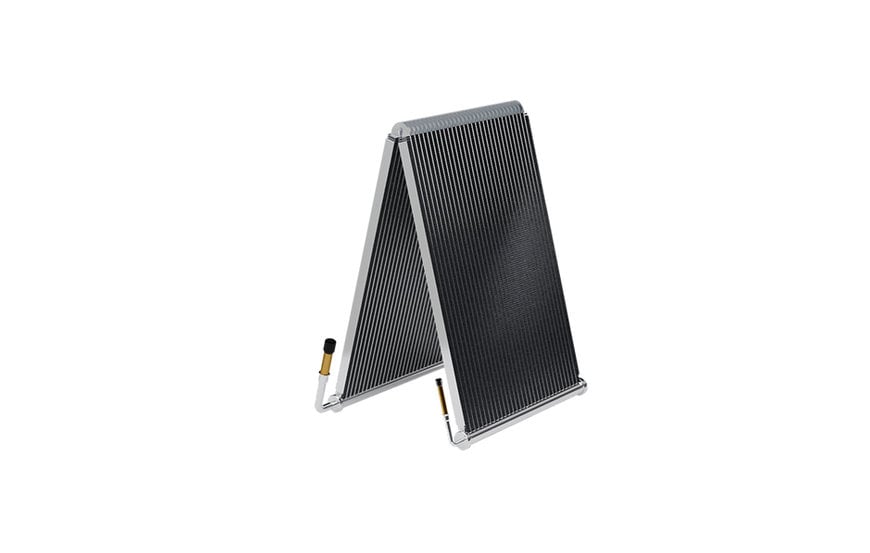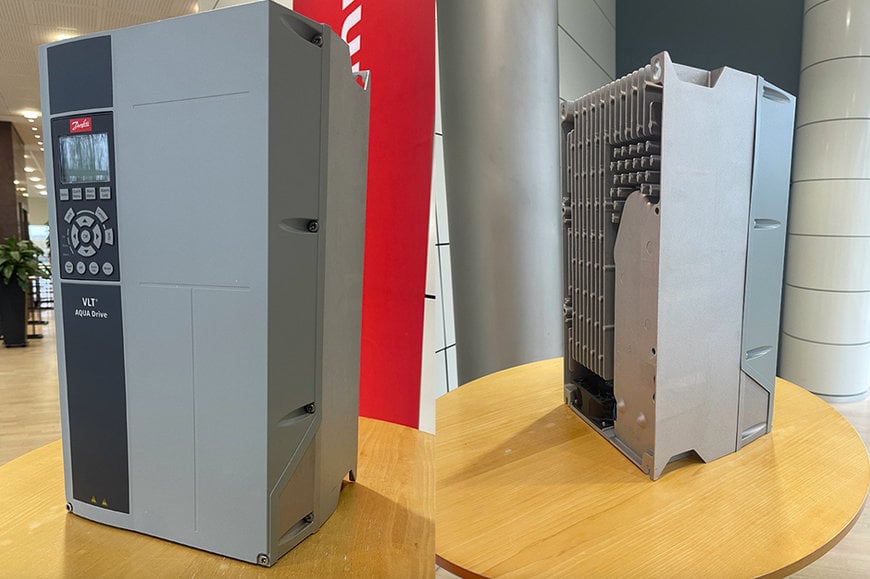www.magazine-industry-usa.com
27
'23
Written on Modified on
DANFOSS JOINS FIRST MOVERS COALITION TO DRIVE GLOBAL DEVELOPMENT OF SUSTAINABLE ALUMINUM
Danfoss joins the FMC aluminium sector, committing that at least 10% (by volume) of all the company’s primary aluminium procured per year will be low-carbon by 2030.

Aluminium is key to the manufacturing of Danfoss’ Micro Channel Heat Exchangers (MCHE) used in the likes of rooftop units, chillers, residential air conditioners, and refrigeration.
The World Economic Forum has announced that Danfoss has joined the First Movers Coalition (FMC), a global coalition to decarbonize hard-to-abate industries.
As a member of the FMC, Danfoss joins a group of industry players harnessing purchasing power to create a market for low-carbon aluminium, sending a strong market demand signal for the emerging technologies essential for a net-zero transition. This commitment by members focuses on creating a sustainable value chain for aluminium and achieving a 50% reduction in CO2 emissions from primary aluminium production by 2050. Danfoss has already entered into negotiations and begun contractual agreements with suppliers for low-carbon aluminium.
Led by the World Economic Forum and the US Government, the FMC targets hard-to-abate sectors including aluminium, aviation, chemicals, concrete, shipping, steel, and trucking, which are responsible for 30% of global emissions. For these sectors to decarbonize at the speed needed to keep the planet on a 1.5-degree pathway, they require low-carbon technologies that are not yet competitive with current carbon-intensive solutions.
FMC member companies commit to purchasing a percentage of near-zero or zero-carbon solutions from suppliers, which may come at a premium cost. If a critical mass of global companies commit a certain percentage of their future purchasing to clean technologies in this decade, this will create a market tipping point that will accelerate their affordability and drive long-term, net-zero transformation across industrial value chains. The FMC is currently composed of 82 members, all global players in their markets.
The aluminium industry generates approximately 2% of global emissions, but it also has the strongest potential to become carbon-negative by 2050. Switching to low-carbon electricity is the biggest step the industry can take to deliver a sector compatible with net-zero targets.
Danfoss has committed to achieving CO2 neutrality in its global operations (Scope 1 & 2) by 2030 – supporting the business ambition to limit global warming to 1.5°C, which has been validated by the Science Based Targets initiative (SBTi), and includes a reduction in value chain emissions (Scope 3) by 15% by 2030. In addition, Danfoss has a dedicated target of reaching 25% emissions reduction from its suppliers by 2030 compared to the 2019 baseline. This commitment is included in the targets of Danfoss’ three step-change initiatives on Decarbonization, Circularity, and Diversity, Equity & Inclusion.

Aluminium is used in many of Danfoss’ products such as the creation of this profile for the Danfoss AQUA Drive. Aluminium profiles are often lightweight, durable, and corrosion-resistant and provide a sturdy and reliable framework, helping to dissipate heat generated during operation and offering protection to internal components.
Already Danfoss has seen progress in decoupling environmental impact from business growth by delivering a 7% decrease in Scope 1 and 2 emissions while growing 15% organically in 2022.
Read more about Danfoss’s ESG ambition here.
More information about the First Movers Coalition can be found here.
The World Economic Forum has announced that Danfoss has joined the First Movers Coalition (FMC), a global coalition to decarbonize hard-to-abate industries.
As a member of the FMC, Danfoss joins a group of industry players harnessing purchasing power to create a market for low-carbon aluminium, sending a strong market demand signal for the emerging technologies essential for a net-zero transition. This commitment by members focuses on creating a sustainable value chain for aluminium and achieving a 50% reduction in CO2 emissions from primary aluminium production by 2050. Danfoss has already entered into negotiations and begun contractual agreements with suppliers for low-carbon aluminium.
Led by the World Economic Forum and the US Government, the FMC targets hard-to-abate sectors including aluminium, aviation, chemicals, concrete, shipping, steel, and trucking, which are responsible for 30% of global emissions. For these sectors to decarbonize at the speed needed to keep the planet on a 1.5-degree pathway, they require low-carbon technologies that are not yet competitive with current carbon-intensive solutions.
FMC member companies commit to purchasing a percentage of near-zero or zero-carbon solutions from suppliers, which may come at a premium cost. If a critical mass of global companies commit a certain percentage of their future purchasing to clean technologies in this decade, this will create a market tipping point that will accelerate their affordability and drive long-term, net-zero transformation across industrial value chains. The FMC is currently composed of 82 members, all global players in their markets.
The aluminium industry generates approximately 2% of global emissions, but it also has the strongest potential to become carbon-negative by 2050. Switching to low-carbon electricity is the biggest step the industry can take to deliver a sector compatible with net-zero targets.
Danfoss has committed to achieving CO2 neutrality in its global operations (Scope 1 & 2) by 2030 – supporting the business ambition to limit global warming to 1.5°C, which has been validated by the Science Based Targets initiative (SBTi), and includes a reduction in value chain emissions (Scope 3) by 15% by 2030. In addition, Danfoss has a dedicated target of reaching 25% emissions reduction from its suppliers by 2030 compared to the 2019 baseline. This commitment is included in the targets of Danfoss’ three step-change initiatives on Decarbonization, Circularity, and Diversity, Equity & Inclusion.

Aluminium is used in many of Danfoss’ products such as the creation of this profile for the Danfoss AQUA Drive. Aluminium profiles are often lightweight, durable, and corrosion-resistant and provide a sturdy and reliable framework, helping to dissipate heat generated during operation and offering protection to internal components.
Already Danfoss has seen progress in decoupling environmental impact from business growth by delivering a 7% decrease in Scope 1 and 2 emissions while growing 15% organically in 2022.
Read more about Danfoss’s ESG ambition here.
More information about the First Movers Coalition can be found here.
www.danfoss.com

